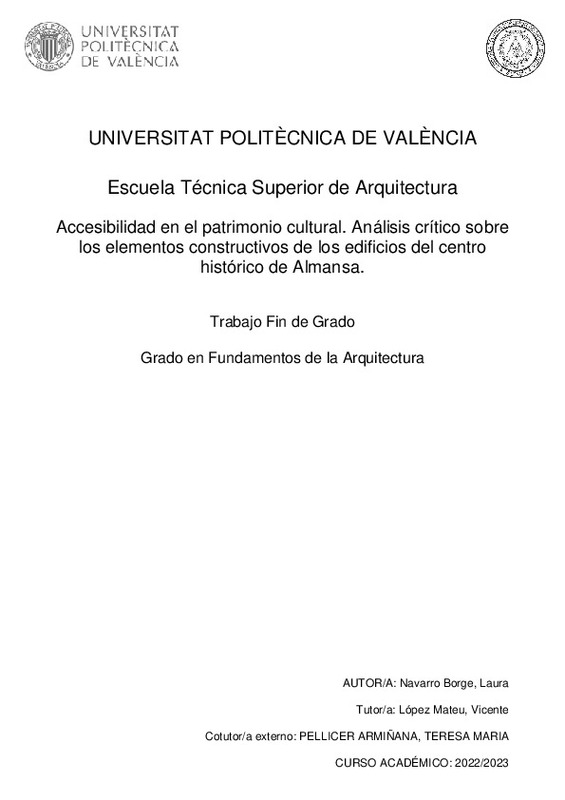|
Resumen:
|
[ES] La preocupación por las condiciones de las personas con diversidad funcional en referencia a los entornos del patrimonio cultural es un tema de actualidad, que requiere considerar soluciones arquitectónicas adecuadas. ...[+]
[ES] La preocupación por las condiciones de las personas con diversidad funcional en referencia a los entornos del patrimonio cultural es un tema de actualidad, que requiere considerar soluciones arquitectónicas adecuadas.
La adaptación de estos entornos conlleva obras que pueden resultar complejas y costosas, no siendo siempre reversibles. Asimismo, implica dificultades de integración y protección patrimonial en relación con el conjunto del edificio y con los elementos constructivos que están relacionados o forman parte del mismo.
A partir del análisis de la situación actual, y de las dificultades que sufren las personas con algún tipo de discapacidad al utilizar los espacios de los edificios es necesario buscar los medios adecuados para mejorar su accesibilidad y funcionalidad. Estos problemas afectan tanto a los edificios patrimoniales como a las condiciones de las actividades culturales que se desarrollan en su interior, ya sean permanentes o temporales, como por ejemplo visitas, exposiciones, conciertos, conferencias, etc.
En este estudio académico se realiza un análisis y reflexión crítica sobre las instalaciones de los edificios para mejorar su accesibilidad. Posteriormente, este análisis general se particulariza en el casco histórico de Almansa. Su objetivo es reconocer las condiciones actuales y realizar propuestas para mejorar el bienestar general de los potenciales usuarios del patrimonio cultural de esta población, tanto residentes como visitantes, teniendo en cuenta su gran interés turístico y cultural.
Para la realización de este estudio se han recopilado datos procedentes de dos fuentes. Por un lado, la teórica: libros, artículos, normativa y otros textos específicos de los archivos, y por otro, los datos recogidos "in situ" en distintos casos de estudio.
Esta documentación ha permitido elaborar fichas de análisis que comparan los distintos edificios patrimoniales seleccionados. La valoración individualizada de los aspectos clave de la accesibilidad permite detectar y diagnosticar las barreras arquitectónicas y urbanísticas existentes en el casco histórico de Almansa, centrando el análisis y la reflexión en aquellos puntos en los que se debería intervenir.
Se proponen líneas de actuación que puedan cubrir las necesidades de los usuarios e integrarse en los edificios sin comprometer los aspectos de protección y conservación del patrimonio. La investigación es un paso más hacia una ciudad inclusiva, con entornos universalmente accesibles.
[-]
[EN] Concern about the conditions of people with functional diversity with reference to cultural heritage environments is a current issue for which it is necessary to provide appropriate architectural solutions.
These ...[+]
[EN] Concern about the conditions of people with functional diversity with reference to cultural heritage environments is a current issue for which it is necessary to provide appropriate architectural solutions.
These retrofits often require building works that can be complex and costly, and moreover they are not always reversible. This adaptation also implies difficulties in heritage protection and integration concerning the whole building and the different building facilities that are a part or a parcel of them.
From the analysis of the current situation and the diverse problems people suffer while interacting with building facilities, it is necessary to look for the adequate means to find the best solution.
These problems affect both heritage buildings and the activities conditions which take place inside them during permanent or temporary cultural activities, for instance visits, exhibitions, concerts, conferences, etc.
In this academic study, analysis and critical reflection are carried out on building facilities for accessibility in general and applied to the historic centre of Almansa.
Its objective is to recognise the current conditions and make proposals to improve the general well-being of the cultural heritage potential users, both residents and visitors, taking into account the great tourist and cultural interest of this town.
To carry out this study, data has been compiled from two sources. On the one hand, the theoretical: books, papers, regulations and other specific texts from the archives, and on the other hand, the data collected ¿on site¿ in the samples studied.
This documentation has made it possible to draw up analysis sheets which compare the different heritage buildings selected.
The individual assessment of the key aspects of accessibility allows for detection and diagnosis of the architectural and urbanistic barriers in the historic centre of Almansa, focusing the analysis and reflection on those points that need to be modified.
Possible lines of action that could cover all users' needs and be integrated into the buildings without compromising the heritage protection and preservation aspects are proposed. The research is a further step towards an inclusive city, with universally accessible environments.
[-]
|







